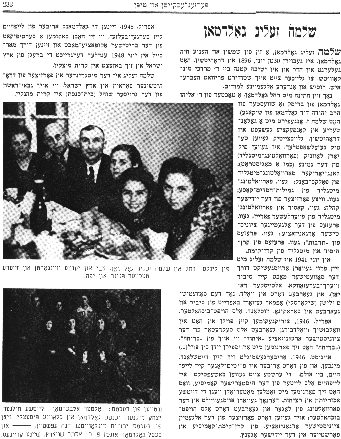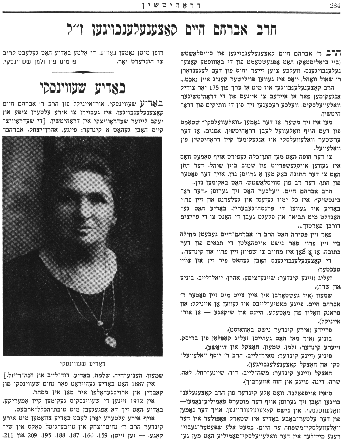Previous Page
|
Next Page

[Page 233]
SHLOMO ZELIG GOLDMAN
Shlomo Zelig Goldman, a son of Shimshon and Henya Chaya Goldman, was born on June 30, 1896 in Drohitchin, and studied in the yeshiva of Rabbi Mordechai Minkovich. At the same time he studied general studies, Hebrew and Russian privately.
After he married Rachel Goldman, a daughter of R. Eliyahu Goldman of Brisk (a sister of Rabbi Yehuda David Goldman of Chicago), R. Shlomo Zelig opened a haberdashery and confectionary in Drohitchin. At the same time he was active in community affairs, serving for many years as a member of the local municipality. He served as a director of the Folks Bank; director of the charity fund; vice-chairman of the Jewish community council; treasurer and director of the firefighter's association; president of the General Zionist Organization; president of the Tarbut School, president of the Keren Hayesod, and member of the Jewish National Fund.
In June 1941, Shlomo Zelig and his wife were sent to Siberia (Upper Berezovka, Altaic District) by the Soviet regime, and they worked in the forest. Following the Soviet-Polish (Shikorsky) Agreement, they were released from Siberia and worked in Sarakino, Russia as senior accountants.
When they returned to Poland in April 1946, Shlomo Zelig worked in Waldburg (Wolbzhich) as secretary of the Zionist Organization Ichud [Unity] and Breicha (an organization involved in helping Jews leave Poland).
In August 1946 he was smuggled into Munich, Germany, and from there, through refugee camps to Leifheim, near Olm. In the beginning he was employed in Leifheim as the director of the historical commission involved in collecting material pertaining to German cruelty and murder. Thereafter he was elected to the camp administration and worked there as senior accountant. Shlomo Zelig was also the chairman of the General Zionist Organization, Jewish National Fund Commission and representative of the Jewish Agency.
In April 1948, the Goldmans left Leifheim for Bergen-Belsen, where they obtained a certificate from the British occupation authorities, and reached the shores of Israel via Marseilles in June, 1948. The settled in Kiryat Motzkin.
Shlomo Zelig was the co-founder and chairman of the Drohitchin Association in Israel, as well as first treasurer of the large synagogue in Kiryat Motzkin.
[Photos:] From left, Rachel and Shlomo Zelig Goldman, Zvi and Yenya Weingarten and their daughters, Penina and Yaffa.
Standing from right: Alter Alberman, Leitshe Milner, Yitzchak Milner, Yenta Goldman and Khlavna Pisetsky. Seated from right: Yehudit Minkovich, Chana Epstein,
----, and Pessel Goldan. Below, from right: Esther Schwartz and Sheina Kreines.

[Page 234]
RABBI AVRAHAM CHAIM KATZENELENBOGEN
Rabbi Avraham Chaim Katzenelenbogen of Svislotch (near Byalistock) descended from the famous Katzenelenbogen family, which is said to derive from the legendary R. Shaul Wohl, who was king of Poland for one night.
Approximately 175 years ago, Rabbi Katzenelenbogen came to Drohitchin looking for a son-in-law from among the family of Drohitchin Valevelskys, who were among the most veteran families in town.
It is believed the name Valevelsky is derived from the Valevel Estate near Drohitchin. Apparently, the first Valevelsky came to Drohitchin from Valevel.
The bride and groom were accompanied to the wedding canopy over a carpet of velvet that stretched from the house to the synagogue. The groom had received a large dowry for the wedding, and his father, the rabbi of Svislotch, also received a dowry.
Rabbi Avraham Chaim, who was called “the Rabbintchik” spent his entire life in study, and his wife Bodya was the breadwinner. Bodya was involved in the grain business and would shake hands with the noblemen using a glove.
Before his death, Rabbi Avraham Chaim asked for forgiveness from his wife for not having complied with the conditions of the wedding ketubba certificate, insofar as a husband is required to support his wife and children.
The Katzenelenbogens had four sons and two daughters:
Zelig (his children: Sheina-Tsippa, Aharon, Yoel-Leib, Bunya and Sarah);
Shimon (died together with his father. Feiga Motya-Liebs was a grandchild; Frank
Volin of Chicago [is] a great-grandson);
Freida (her children are unknown);
Bunya (her husband was Zelig Kaplan of Brisk. Their children: Zalman, Shimon, Chatskel and Dvasha);
Pinya (her children: Meir-Leib, Rabbi Yosef Valevelsky and Chatzkel Katzenelenbogen);
Chatzkel (his children: Moshe-Leib, David, Sheina-Rachel, Leah, Sarah, Dina, Feiga and Chava Averbuch).
It's noteworthy that all of Rabbi Katzenelenbogen's children used their mother's last name, Valevelsky, and not Katzenelenbogen. The name of the great-grandmother Bodya was also very popular in the Valevelsky family until the present. Almost all girls born later into the Valevelsky family were named Bodya. The original Bodya lived for almost one hundred years.
Information from Zalman Shevinsky
Bodya Shevinsky
[photo:] Bodya Shevinsky
Bodya Shevinsky, a great-grandchild of Rabbi Avraham Chaim Katzenelenbogen, was born to her parents, Tsippa and Leizer Shedrovitsky in Drohitchin. (The Shedrovitskys had eight children: Feiga, Aharon-Yitzchak, Avraham-Shimon, Shlomo, Bodya, David-Leib and Chana Reizel).
In 1887 Bodya married Nachum Shevinsky of Kobrin, and assisted her husband in business. In 1912 the Shevinskys arrived in the United States, and Bodya became involved in her community service work. In her older years, Bodya and her children Rabbi Nachum-Yitzchak and Toiba-Gittel Sacks [live] in Chicago. See pp. 159, 166, 187, 188, 195, 209 and 211.
Previous Page
|
Next Page
This material is made available by JewishGen, Inc.
and the Yizkor Book Project for the purpose of
fulfilling our
mission of disseminating information about the Holocaust and
destroyed Jewish communities.
This material may not be copied,
sold or bartered without JewishGen, Inc.'s permission. Rights may be
reserved by the copyright holder.
JewishGen, Inc. makes no representations regarding the accuracy of
the translation. The reader may wish to refer to the original material
for verification.
JewishGen is not responsible for inaccuracies or omissions in the original work and cannot rewrite or edit the text to correct inaccuracies and/or omissions.
Our mission is to produce a translation of the original work and we cannot verify the accuracy of statements or alter facts cited.
 Drogichin, Belarus
Drogichin, Belarus
 Yizkor Book Project
Yizkor Book Project
 JewishGen Home Page
JewishGen Home Page
Yizkor Book Director, Lance Ackerfeld
This web page created by Lance Ackerfeld
Copyright © 1999-2026 by JewishGen, Inc.
Updated 13 Dec 2001 by LA

 Drogichin, Belarus
Drogichin, Belarus
 Yizkor Book Project
Yizkor Book Project
 JewishGen Home Page
JewishGen Home Page